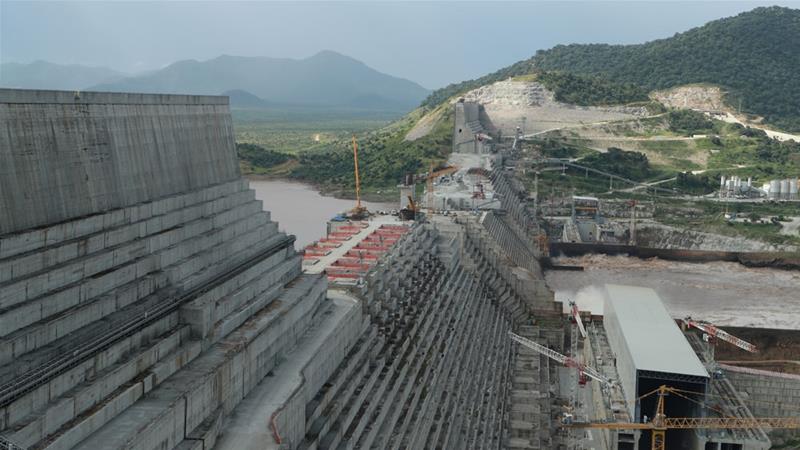
Now that the filling of the GERD is on the agenda and more than 73 per cent of the dam construction is completed, Ethiopia needs to abandon its previously timid posturing and low-profile diplomacy and emerge bolder and more assertive. It has to do this in order to defend its rightful claims on the Nile waters instead of trying to appease the Egyptian authorities. Cairo is always intent on being more assertive when conditions are favorable to its policy regarding the use of the Nile waters while assuming a low profile when the going gets tough.
The construction of the GERD has now reached an irreversible stage. No force on earth can stop its march and final completion. No aggressive diplomacy nor great power intervention will force it change direction as it cannot force the Nile change its course. Ethiopia is undoubtedly standing on the verge of victory on the Nile dispute and the GERD project. There is no reason for Ethiopia to push a conciliatory and hesitant pretentiousness anymore and need to be bolder and self-confident now more than ever. But this newly discovered self-confidence need not degenerate into another form of arrogance.
Ethiopia does not have to seek the diplomatic or political goodwill or intervention of any great power in order to complete the construction of the GERD because it has so far counted on its own resources to complete what it has already completed. It should not accept any diktat to complete the remaining 23 per cent of the project. This is not only a conclusion drawn from sheer arithmetical calculation. These figures rather reflect the relationship of forces between those who want the GERD completed and those who work hard to sabotage it.
For analytical purpose, we can perhaps divide relations between Cairo and Addis Ababa in the last nine years since the start of works on the GERD, into at least four phases or stages. The first phase consisted of Ethiopia’s launching of the project while Cairo was caught in the middle of a popular revolution to topple the Mubarak military dictatorship. Egypt had no time to realize or seriously evaluate Ethiopia’s determination to go ahead with the GERD project. Egypt’s intellectual and academic elites, the media and military establishment that are usually vociferous when it comes to defending what they call “Egypt’s exclusive right on the Nile water” were surprised by the revolutionary events so much so that they were oblivious of Ethiopia’s newly found vision or intentions.
On the other hand, Egypt’s ruling elites were caught in their age-old illusion or stereotypical thinking that Ethiopia will never dare use the waters of the Nile to develop its economy. They thought that Ethiopians would be scared of a military confrontation with Egypt and would not invite trouble on themselves by going ahead with their project. They also thought that Ethiopians were divided, poor and indecisive and would not attempt something that they thus far avoided.
All those Egyptian predictions, vicious calculations, projections or estimations however proved wrong and when the Egyptians woke up from their slumber or their prejudices, it was too late to turn the clock back. The GERD was in the throes of birth and bound to be born sooner than later.
The second phase of Ethio-Egyptian relations on the GERD was characterized by Cairo’s realization of Ethiopia’s silent but determined work on the project. The late Egyptian president Mohamed Morsi was in power and he started his presidency by expressing the old Egyptian policy that not a drop of water will be taken from the Nile. Morsi was intent on maintaining the old Egyptian claims on the Nile in order to appease his critics and opponents. This phase of Ethio-Egyptian relations on the GERD was short-lived as Morsi’s presidency was also short-lived.
The third phase in Ethio-Egyptian relations was ushered in when the incumbent president Abdul Fatah Al-Sisi overthrew the fledgling Morsi regime in a military coup and assumed power in Cairo in the middle of chaos and carnage that led to the routing of the revolution and the liquidation of the Moslem Brotherhood party that had assumed power through a democratic election. Subsequently, president Al-Sisi was busy consolidating his power and had no time or enough focus to deal with the Nile or GERD issue.
When the dust settled in Tahrir Square and things became clearer, the Egyptian president started to address the Nile or GERD agenda by reasserting his government’s unwavering commitment to defend and maintain what he called Egypt’s inalienable and exclusive rights on the river. That was also meant to appease the restive Egyptian people who were brainwashed for decades, if not for centuries, into believing that the Nile was the God-given and incontrovertible property of Egypt and Egypt alone.
First, the president’s conciliatory or low profile diplomatic swagger was evident until he could grasp and digest the situation around the GERD issue. At the end of his diplomatic hibernation, he too woke up to the reality that Ethiopia was serious with the GERD project and that activities had already gone too far although they could have been reversed with Egyptian strong arm tactics as some hardliners in the Egyptian establishment believed.
Unfortunately or unfortunately, this line of thinking did not work because Ethiopia had been involved in a very dynamic and proactive diplomatic activities to explain its intentions or objectives to the Egyptian and the international community. This phase in their relations lingered a relatively long time as the Egyptians could not turn down Ethiopia’s good intents and resort to force or to arm-twisting tactics. They seemingly spent much time exploring the available options to frustrate if not nip in the bud Ethiopia’s nascent optimism and longdelayed awakening.
The fourth phase in Ethio-Egyptian relations on the GERD consisted of Egypt’s overt or covert attempt to torpedo Addis Ababa’s diplomatic efforts and become part of the GERD project on the Nile as a member of the Nile riparian state bound by a joint agreement to become a beneficiary or a cooperative partner of the long vision of turning the Nile into a river of friendship and cooperation. The Egyptians did not officially object to this vision because it would be absurd on their part to reject what the international community regarded as legitimate and right in the context of global economic realities. Rejecting Ethiopia’s proposal outright would amount to the violation of these universally accepted principles.
In the second half of this phase, Cairo was wavering between the diplomatic and other alternatives. Using force to impose Egypt’s ultimatum was obviously out of question because of the universal condemnation it would inevitably generate. Although the regime paid lip service to peace and cooperation, it avoided a dangerous gamble by trying to impose its will by force as the old school of thinking in Cairo advocated. So, the Egyptians apparently tried to exhaust all soft and hard tactics within the diplomatic option ultimately leading to Cairo seeking Washington’s intervention to put pressure on Addis Ababa to accept a solution that would be favorable to Cairo. That solution only amounted to be an old wine in a new bottle.
Egypt’s calculations were apparently simple. Ethiopia is highly dependent on Washington for its economic survival in terms of securing loans and assistance. Moreover, Washington and Addis share a joint pact against terrorism in the region. Moreover the political situation in Ethiopia was fluid as the economic reforms were not consolidated. The Egyptians apparently thought that Addis Ababa would bend under the pressure from Washington and accept the terms of US mediation on the GERD. This line of thinking looked promising for some time until recent events upset the situation, leading to the break in the so-called Washington mediation talks. The outbreak of the corona virus pandemic has obviously played a decisive role in this process.
For the last few months or so, all countries involved in the mediation process were busy dealing with the pandemic and the GERD controversy was almost forgotten. However, recent diplomatic gestures by Egypt, Sudan and Ethiopia led to a promised return to the negotiating table although the modalities to give a second life to the talks is not evident. Meanwhile Ethiopia has emerged stronger and more determined from the diplomatic deep freeze. It has made it clear that it will not negotiate the pace of the filling of the GERD dam and that it will continue the construction work on the dam until it is completed and commissioned. This is not empty talk. This is rather tough talk backed up with tough action and supported by the entire people of Ethiopia.
In the coming few months or so, Ethiopia is expected to keep on defending its interests boldly and courageously and remain uncompromising on the modality of dam filling which Egypt tried and failed to turn it into the gist of the controversy. Bringing the matter to the attention of the UN Security Council would help Ethiopia more than Egypt in achieving its objective. Egypt often portrays itself as the victim of some imaginary dark intrigue. This is already proved to be a hoax or an intrigue. The real victim of Egyptian diplomacy on the Nile is rather Ethiopia which was deprived of its inalienable right to use its natural resources to develop its economy on the basis of an archaic and defunct colonial era agreement. This is the real strength of Ethiopia’s diplomatic position at present and should serve as the basis of its self-confidence and assertiveness in the future.
The Ethiopian herald June 7,2020
BY MULUGETA GUDETA




